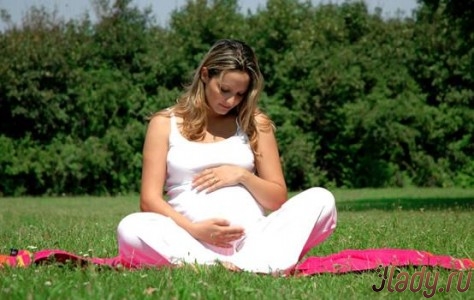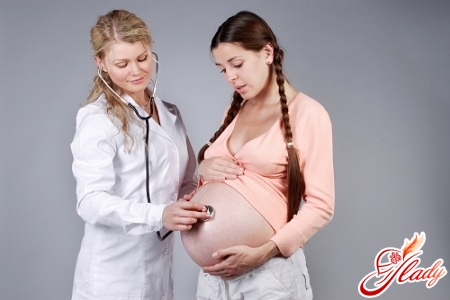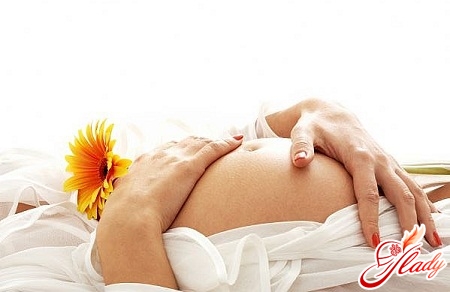
In the first month of pregnancy, a woman most oftendoes not yet suspect that a new life has begun to emerge in her body. No visible changes in her well-being or appearance have yet occurred, so the main sign that prompts the expectant mother to think about her interesting situation is most often a delay in menstruation.
Feelings of a woman in early pregnancy
However, contrary to popular belief, the absencemenstruation is not the only symptom of pregnancy. After conception, the female body begins to intensively prepare for future motherhood and important changes occur in it. Many women simply do not pay attention to the sudden drowsiness and constant fatigue, attributing these signs of pregnancy to overwork at work. During this period, expectant mothers' mammary glands slightly increase in size, the consistency and amount of cervical mucus changes, a metallic taste appears in the mouth, and frequent urges to urinate occur, reminiscent of cystitis. In the first weeks after conceiving a child, women usually do not experience nausea, most often it occurs from the second month of gestation. But in medical practice, there are cases when pregnant women begin to complain of attacks of toxicosis a few days after fertilization of the egg. A woman may be irritated by the smells coming from the kitchen during cooking, and the aromas of perfumes that she previously liked. To the listed signs it is worth adding frequent mood swings, capriciousness and even a tendency to depression, the causes of which are hormonal changes in the body. Signs can occur in different combinations. However, if a woman is young and completely healthy, pregnancy symptoms during this period may not bother her.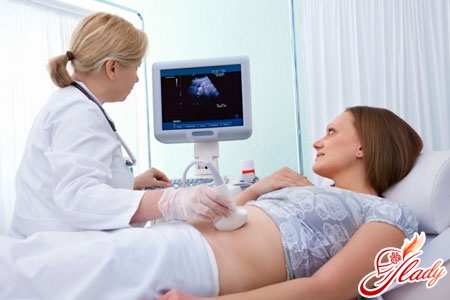
The process of the origin of life
What happens in a woman's body?during the first month of pregnancy? Immediately after fertilization by the sperm, the egg begins to move along the fallopian tube towards the uterus. Penetration of the fertilized egg into the uterine cavity occurs approximately 7 days after conception. Then the placenta is formed, through which the baby will receive oxygen and all the nutrients for its development from the mother's body. In parallel with the placenta, the umbilical cord is formed and the process of active development of the embryo begins. From this moment, the woman's body begins to produce chorionic gonadotropin - the pregnancy hormone. By the end of the second week, three germ layers are formed, which are the basis for the subsequent development of all organs, systems and tissues. The chord, blood, lymph, vessels, muscles, cartilage and sex glands arise from the middle layer. The formation of internal organs also begins from it. The outer germ layer gives rise to the formation of the nervous system, skin, hair follicles and nail plates. The respiratory and digestive systems are formed from the inner germ layer. About 21 days after conception, the baby's spinal cord and brain begin to develop. By the end of the first month of pregnancy, the embryo already has blood vessels and a tiny heart, which makes its first attempts to contract, limbs begin to develop and eye sockets appear. Despite such a rapid development process, the future little person remains very small, its size does not exceed a grain of rice. It is surrounded on all sides by amniotic fluid. After some time, the embryo will turn into an embryo, then into a fetus, and at the end of 9 months of pregnancy, the happy parents will finally be able to see their long-awaited baby.
Possible pathologies in the first weeks of pregnancy
At the early stage of pregnancy, the embryo is veryvulnerable, and any carelessness on the part of the mother can lead to a spontaneous miscarriage or the development of serious pathologies in the child. Since the woman most often does not yet suspect her condition, she continues to work a lot, play sports and physical labor, eat irregularly and unbalanced meals, rest little and do not take care of her health. But it is not recommended to do this, since it is during this period that all organs and systems of the embryo are formed and such factors as taking medications, smoking, drinking alcohol can have a negative effect on the course of pregnancy and the health of the future baby. In the first weeks after conception, a woman may experience such a pathology as an ectopic pregnancy, in which the fertilized egg develops not in the uterine cavity, but in the fallopian tube, cervix or ovary. The fertilized egg is in conditions in which it cannot develop further and after 1-2 months this leads to a spontaneous rupture of the fallopian tube, as a result of which the woman experiences severe internal bleeding. Symptoms indicating the onset of an ectopic pregnancy are pain in the lower abdomen, scanty bloody discharge, dizziness. If a fallopian tube ruptures, the pregnant woman experiences severe pain in the groin area, pallor, nausea, and possible fainting. Any delay in contacting a doctor can end badly for a woman; the only way out in this case is urgent surgery. Another pathology that occurs at an early stage of pregnancy can be a cyst, which occasionally forms on the surface of the corpus luteum and can reach a size of 8 cm. Most often, it goes away on its own in the first half of pregnancy, but sometimes the cyst ruptures, causing bleeding. As in the previous case, the only treatment for this pathology is surgery. Removal of a corpus luteum cyst usually does not affect the course of pregnancy. At the initial stage of pregnancy, women often have fear due to the possibility of miscarriage. Those representatives of the fairer sex who have previously had spontaneous abortions are especially worried. There can be many reasons for miscarriage, the most common of which are:
- damage to the walls of the uterine tube and uterus as a result of earlier abortions;
- congenital pathological development of the uterus;
- severe stress;
- lifting and moving a pregnant woman with weight;
- intensive sports and dancing;
- jumping from a height, excessive shaking in transport;
- feverish condition;
- taking certain medicines;
- taking hot baths;
- sexual intercourse, if the previous pregnancy ended in miscarriage.
For a woman in early pregnancypregnancy, you should immediately go to bed and call a doctor if you notice obvious signs of a miscarriage - the appearance of painful sensations and spasms in the lower abdomen, accompanied by bloody discharge (can be either profuse or barely noticeable). Bed rest and timely medical care can save a woman from a miscarriage.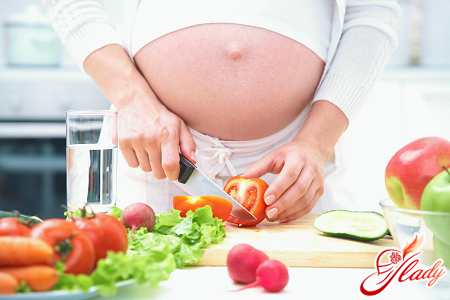
Vitamins and microelements needed in the first month of pregnancy
It's very good when a woman planspregnancy in advance, because in this case she has a higher chance of successfully bearing and giving birth to a healthy baby. Rational nutrition, moderate physical activity, fresh air, giving up bad habits and positive emotions will prepare her body for conception in the best possible way. It is important for a woman to take vitamins during the period of pregnancy planning and after its onset, the main one of which should be vitamin B9 or folic acid. It has a beneficial effect on the intrauterine development of the fetus in the first months of pregnancy. Due to a deficiency of folic acid in the mother's body, the child can be born with a defect of the nervous system, a hare lip or a cleft palate. Premature birth is also often a consequence of a lack of vitamin B9 in pregnant women. The norm of folic acid for expectant mothers should be at least 800 mcg per day. If a woman already has children with congenital defects, then her daily dose of the vitamin is increased to 4 mg. It is best to take folic acid in multivitamins designed specifically for pregnant women or in tablets. Foods rich in vitamin B9 include oranges, lemons, grapefruits, legumes, asparagus, and all green vegetables. But folic acid is poorly absorbed from foods, so it is better to take it as part of medications. A woman should not forget about vitamin E. In the first weeks of pregnancy, it is indispensable, as it helps the body produce normal levels of sex hormones necessary for bearing a fetus. For a woman in the first trimester of pregnancy, the daily dose of this "fertility vitamin" should be at least 1,500 IU. It is found in small quantities in foods, so the expectant mother must take it as part of a separate drug or multivitamin. Of all the microelements, iodine is the most important at the beginning of pregnancy. Its daily norm should be at least 150 mcg. If a pregnant woman lives in an area with iodine deficiency, then the daily dose of this microelement should be increased to 200 mcg. Iodine is present in sea fish, eggs, milk, iodized salt. The necessary dosage of the microelement is in all vitamin preparations for pregnant women.
Determination of pregnancy using test and analysis for hCG
If the first month of pregnancy proceedsnormal, then the woman can take her time registering with an obstetrician-gynecologist. The expectant mother can reliably determine her condition using a pregnancy test purchased at a pharmacy. It determines the presence of human chorionic gonadotropin in the woman's urine. In order for the test to show an accurate result, it must be done after a delay in the menstrual cycle - then the hormone level will be high. The system is lowered into a container with morning urine: 1 strip that appears on the tape after contact with the liquid indicates that the woman is not pregnant, and 2 strips indicate pregnancy. The presence of the human chorionic gonadotropin hormone can be determined not only in the urine of a pregnant woman, but also in her blood. However, this study can only be carried out in a laboratory setting by taking an hCG test. The study will determine not only the presence of the hormone in the woman's blood, but also its level, thanks to which it is possible to judge how normally the pregnancy is proceeding.
Medical assistance at the initial stage of pregnancy: when is it necessary?
In what cases should a woman see a doctor in the first weeks of pregnancy? There may be many reasons:
- cold;
- elevated temperature;
- early toxicosis;
- bloody discharge from the vagina;
- pain in the abdomen
- any other symptoms that cause anxiety in pregnant women.
The expectant mother should beware of colds andviral diseases, since any illness can negatively affect the course of pregnancy and even provoke its spontaneous termination. Many medications that people are used to treating a sore throat, runny nose and cough are strictly contraindicated in early pregnancy, since they can cause abnormalities in the intrauterine development of the fetus. Before starting treatment with any drugs or medicinal herbs, a woman should consult a doctor. It is much worse if a viral infection or cold in a pregnant woman is accompanied by a feverish condition, since a high temperature can cause a miscarriage or a frozen pregnancy. The difficult situation is aggravated by the fact that taking antipyretic drugs during the first months of pregnancy is prohibited. In this case, the only way to reduce the temperature is to drink plenty of fluids (weakly brewed black tea with honey and lemon, raspberry and linden blossom decoctions, herbal infusions). Throughout the entire period of the disease, the woman should be under the supervision of a specialist. Temperature syndrome can appear not only against the background of a cold and acute respiratory viral infection, but also as a result of serious inflammatory processes in the body. A pregnant woman should never delay treatment or wait for the temperature to normalize on its own. Only after the expectant mother has passed all the necessary tests, the doctor will be able to give her the correct diagnosis and select the most gentle and adequate treatment that does not have a detrimental effect on the development of the embryo. As already written above, toxicosis rarely manifests itself in the first weeks after conception. But if severe nausea and vomiting bother a woman from the very beginning of pregnancy, then she needs to consult a doctor. In order to alleviate the manifestations of toxicosis, a pregnant woman should adhere to certain rules in nutrition:
- to ensure that the diet is attended by the necessary norm of carbohydrates, proteins and fats - rational nutrition promotes good digestion during pregnancy;
- to avoid dehydration of the body to drink a lotfresh juices, fruit drinks, compotes, and use soups and broths. When nausea occurs against a background of copious drinking, replace it with the use of foods containing a large amount of liquid (watermelons, melons, citrus fruits, any fruits and vegetables in fresh form);
- do not take any medication during nausea;
- there are only those foods that do not cause disgust;
- eat often and in small portions, at moments of nausea, refuse to eat;
- try to sleep and rest as long as possible;
- before you get up in the morning from bed, eat an apple, a handful of raisins or a cup of warm tea;
- protect themselves from unrest and stress.
A woman in her first monthpregnancy, may be bothered by unpleasant sensations in the lower abdomen, reminiscent of menstrual pain. If the pain is weak, occurs occasionally and is not accompanied by bloody discharge from the vagina, then she should not worry. But when the pain becomes strong, cramping, and there are blood impurities in the discharge, then the pregnant woman should urgently consult a gynecologist. Such symptoms may indicate an ectopic pregnancy or a threat of miscarriage.
Nutrition, intimate life and the regime of the day of the future mother
A woman preparing to become a mother is obligedtake a responsible approach to the quality of your diet. From the moment of conception, only natural and healthy food should prevail in her diet. At the initial stage of pregnancy, a woman does not yet need to eat for two, the recommended average daily calorie intake is 2500 kcal. Fresh fruits, vegetables, iodine- and potassium-containing foods should prevail in the diet of the expectant mother. But a woman should refuse fatty and synthetic foods, semi-finished products, fast food, alcoholic beverages, coffee and strong tea not only during the entire pregnancy, but also during breastfeeding. Most of the fairer sex, having learned about their interesting position, refuse sex, fearing to harm their baby. The opinions of specialists regarding intimate relationships in the early stages of pregnancy completely differ. Some gynecologists believe that sexual intercourse should be excluded at this time, as it can cause harm. But most doctors are sure that moderate sex in the first period after conception has the right to be, but it should be approached with extreme caution and responsibility. Contraindications to intimacy with a partner are poor health of the woman and the threat of miscarriage. Despite the onset of pregnancy, the beautiful half of humanity continues to go to work or study and run the house, because the maternity leave is still far away, and there is not always someone to help with household problems. But the expectant mother should remember that now she is responsible not only for herself, but also for the life and health of her baby, so she should not overwork and get tired. A woman needs to rest whenever she feels tired and get enough sleep at night. Having adjusted her daily routine, she will be able to do her usual work without much effort.




